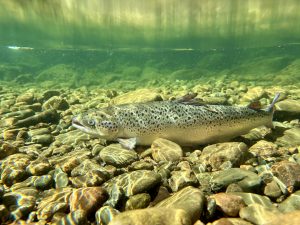The regulation, published today in the Canada Gazette, clarifies conditions under which aquaculture operators may feed and care for their fish as well as deposit organic matter. The regulation codifies current practices and ensures greater public transparency while allowing farmers to continue to grow healthy seafood, says Pamela Parker, Executive Director of the Atlantic Canada Fish Farmers Association.
“Salmon farming is one of our region’s most important industries. This modernized regulation will help us take advantage of the growing demand for healthy protein to create jobs, revitalize our coastal communities and keep our young people at home,” says Parker. “The regulation covers all aquatic species farmed in Canada – including finfish and shellfish. In the past, many of these operations have been governed through provincial regulations only. Now they will also be regulated by the federal government which should increase public confidence.”
Canada’s aquaculture industry is regulated by no fewer than 10 federal agencies in addition to provincial ones. The rules often overlap and are even contradictive in many cases, making it cumbersome for operators and confusing for the public.
“We are happy to see that this federal regulation does not duplicate provincial regulations where they exist,” says Parker. “The aquaculture industry federally has been regulated like a wild fishery, which we are not. This new regulation clarifies the conditions under which farmers operate, including how they feed and treat their fish under the Fisheries Act. Similar regulations that allow deposits in the marine environment already exist under the Fisheries Act for both the pulp and paper and mining industries.”
The new regulatory framework does not change the way sea lice treatments are approved or used in Canada. As in the past, only treatments that have undergone extensive risk assessments by Health Canada to ensure they are safe for salmon and other species, the environment and human health are registered for use. Farmers have access to two approved bath treatments for sea lice management – both used only under the direction of a veterinarian and by prescription.
“Our farmers welcome this regulation because it will clearly articulate roles and responsibilities, increase operational certainty and increase public confidence,” says Parker. “In addition to following both federal and provincial regulations, all Atlantic Canadian salmon farming companies are involved in third-party certification programs to ensure their salmon is sustainably produced and of the highest quality.”
Nova Scotia and New Brunswick alone produce over 300 million meals of farmed Atlantic salmon every year. Salmon farming in these two provinces contributes $356 million to provincial economies and creates over 3,000 jobs.
“In a world where land and fresh water resources are shrinking, the global salmon farming industry represents one of the best ways to help feed the world’s growing population with a minimal environmental footprint,” says Parker. “Our region plays an important role in the success of the global salmon farming industry. In fact, 50 per cent of Canada’s farmed salmon is grown in Atlantic Canada. With our vast aquatic resources, innovation and technical expertise, we have a tremendous opportunity to continue to create jobs and economic prosperity in our coastal communities. This regulation provides the necessary foundation to help us further embrace that opportunity.”
For more information about the new Aquaculture Activities Regulation, visit: http://www.gazette.gc.ca/rp-pr/p2/2015/2015-07-15/html/sor-dors177-eng.php
The Atlantic Canada Fish Farmers Association (ACFFA) is an industry funded association working on behalf of the salmon farming industry in New Brunswick and Nova Scotia. The ACFFA represents salmon producers in addition to a wide range of supporting companies and organizations.
